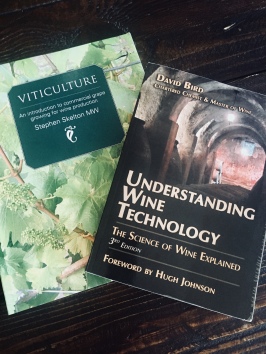Well, I have officially cleared my first hurdle in my WSET Diploma pursuit! Now there’s just four more exams and a research paper. As I mentioned in my previous post on the Diploma, Unit 2 is required to be taken before any of the other five Units are attempted. But, once you pass Unit 2, you’re free to move onto whichever Unit(s) you choose. (Editorial Note by Hubs: Ms. Noelle passed “with Distinction” – a designation akin to summa cum laude for this particular Unit – the highest honor awarded. The dogs and I simply couldn’t be more proud of her!!)
As I look back at my studies for Unit 2, there are definitely some habits that I will continue as I move forward with my Diploma pursuit (the “dos”) – and others that I absolutely will not (the “don’ts”). Now, anyone who grew up reading Glamour back in the day probably recalls their fabulous back page of DOs and DON’Ts. Although it wasn’t particularly PC – it was absolutely my favorite part of the magazine (admit it, yours too!). So, without further ado (and with a similar lack of PC) here are my WSET Diploma Unit 2 DOs and DON’Ts:

Unit 2 DOs
DO read the suggested readings. Even though all questions on the exam come from the actual Unit 2 textbook, I found the supplemental readings invaluable. Specifically, Viticulture by Stephen Skelton MW and Understanding Wine Technology by David Bird MW (future book review/blog post forthcoming!)  Both of these books cover similar information as the Unit 2 text, but they go into more depth and detail. Being able to read about concepts such as the effects of nutrient deficiencies in a vineyard, or SO2 limitations in wine, in plain English helped me get a more fundamental understanding of the subject matter. As I might’ve mentioned before – I don’t “science” very well. 😉
Both of these books cover similar information as the Unit 2 text, but they go into more depth and detail. Being able to read about concepts such as the effects of nutrient deficiencies in a vineyard, or SO2 limitations in wine, in plain English helped me get a more fundamental understanding of the subject matter. As I might’ve mentioned before – I don’t “science” very well. 😉
DO study every day – even if it’s just a little bit. Some days I dove into the text for a few hours, and others I just reviewed my outlines and flashcards. But I honestly don’t think there was a single day in between when I had my first Unit 2 class and when I took my exam that I didn’t study for at least a short while. I wanted to keep what I learned at the forefront of my brain so it was easy to recall, because believe me, at 45 I have amassed a lot of useless crap in there. (If anyone wants to know the lyrics to any song on The Smiths “Louder Than Bombs” album, or the chronological order of deaths on The Walking Dead, I’m your gal).

DO practice the sample questions in the Unit 2 textbook. I won’t go into too much detail as to specific questions on the exam, but let’s just say that some of them were eerily similar to the sample questions in the textbook. Review these. You won’t regret it.
Unit 2 DON’Ts
DON’T get stuck in the minutiae. When studying, I have a habit of trying to learn – and memorize – everything. I tend to get bogged down in the details . . . sometimes at the expense of moving forward.
With Unit 2, I spent a lot of time memorizing types of vineyard pests and learning which rootstocks do best in which types of soil. And no, this wasn’t because I was fascinated with grapevine yellows or Vitis rupestris. I was just totally struggling with these areas and thought that if I memorized as much as I possibly could about them that I’d do better on the exam. So, I spent an exorbitant amount of time on these topics and, while there were a couple exam questions on them, there were more questions on quality control and herbicides – areas that I hadn’t spend much time on because I’d been so in the weeds (pun intended) with others.
DON’T overthink the exam questions. This advice came to me courtesy of Spitbucket.net after her experience with the exam, and it was spot-on. Come exam time, you’ve learned so much that you’re likely to overanalyze the test questions and wonder if the examiners are actually asking you something else or trying to trick you. (Answers: they’re not, and they’re not.) The Brits might be strict and reserved, but they’re a fair lot. Feel free to remind me of this quote when I don’t do well on one of my upcoming exams.
And finally, DON’T overdo it. Although I mention above that studying every day is a DO, it is possible to go overboard. Like accessories, sometimes less is more. So if you’re practicing flashcards while getting a bikini wax – you’ve probably taken this too far. Purely hypothetically, of course.
My next WSET class is in a few weeks – I’m tackling Unit 5: Sparkling Wines of the World. And yes, I’m already making my way through the recommended reading. But, lesson learned, I’m leaving the book at home before my next appointment at OC Wax.
Glorious news! Well done! And all good tips, per usual. Cheers and keep up that momentum!
LikeLiked by 1 person
Thank you!! I know you can relate to what I’m going through. 🙂
LikeLike
Well done! 🍾 I applaud you Do’s and Don’t’s especially about not focusing on The minutiae, best thing always is to think BIG topics first then add smaller pieces you need to remember under that main heading.
LikeLiked by 1 person
Thanks so much! My entire life I’ve had a problem focusing on the little things . . . still trying to remember to see the forest for the trees! My outlines definitely help with that. 🙂
LikeLiked by 1 person
A personal story, even though I got a PhD in chemistry in my early 20s I studied part time for a degree in psychology in my 40s. I was always very organised and systematic so in my final year I looked at the syllabus and saw 8 major topics, took 8 sheets of paper and wrote the topic titles at top of each sheet. Each major topic had 4-5 sub topics, so I did the same with 30-40 sheets and pinned them to the major sheets. As each sub topic was lectured and studied my task was to create a mind map of it on the relevant sheet. As the year ended I now had 4-5 sheets of sub topics mind maps under a blank major sheet. I now created a single sheet of the sub topics combined into the major sheets. When the exam came all I had in my head were those 8 sheets, but upon really concentrating hard I could “see” any sub sheet and extract enough information to answer any question. All gleaned from a particular lecture on how our brains work in hierarchies … hope this helps!
LikeLike
That is insanely organized and I LOVE it!! Thanks for sharing! 🙂
LikeLiked by 1 person
Congratulations! On to the next challenge. I think your Dos and Dont’s are spot-on, especially the part about not trying to memorize everything. As I studied the rootstocks I almost went nuts. Then I decided I would focus on the main features of each and let the rest go. It was enough!
LikeLiked by 1 person
Thanks Lauren! And Congratulations to you too! 🙂 YES – those rootstocks just about put me over the edge. Which Unit is next for you?
LikeLiked by 1 person
Still waiting for IWC to post the fall schedule on their site. 😡 Kathy plans to take sparkling and spirits together. That might work, depending on what’s offered. Feels like I’m still in recovery from Unit 2!
LikeLike
I was glad to get Unit 2 out of the way! 😉 Don’t get me wrong, I really enjoyed the subject matter, but it was just that the sample questions showed that they could ask you any “insignificant” fact in the book. I must have read that lovely Unit 2 book 5 or 6 times – highlighting new bits (in several colours) along the way.
I too was overwhelmed by the rootstocks, until, exactly as you said, you ask yourself, how many questions are there going to be on rootstocks? One or two! It is indeed very easy to spend an exhorbitant amount of time on four pages, when another four pages on climates (say) just soak in. I guess, in reality, the amount on information on those rootstocks pages is ten times the information on those about climate, AND those rootstock tables are not the easiest way to learn, anyway.
But all it all paid off – you gotta study kids! – and I was glad my result reflected the amount of work I put in (92 – thank you very much – MW is calling! ;-). That really gave me a great boost to continue – I would have anyway, but I now had a more happily determined demeanour. My next was Unit 1, which I have just finished the main weeks of. I wasn’t sure the business and marketing side was going to be that interesting – how wrong was I?! So, all is well (so far).
Good luck with the rest of your studies. And if it all gets a little tough at times, there is a always a bottle nearby, and you can justly claim you need to spend some time on your tasting techniques. 🙂
LikeLiked by 1 person
Thanks! And Congratulations to you for starting off your Diploma so well! 🙂 I’m debating whether to try and cram in the Unit 1 case study before year end, but will likely wait until early 2019. I’m not in a huge rush to plow through this . . . and I want to learn and retain as much as possible in case I pursue the MW too. Keep in touch with your progress – and Good Luck!
LikeLike
Great job with Diploma 2, and many thanks for the nice comments on my blog. You’ll kill sparkling wines!
LikeLiked by 1 person
Thank you! And I hope you’re right! 😉
LikeLike